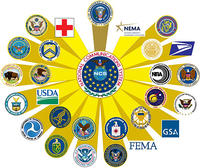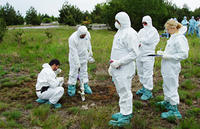-
Fences make good neighbors
Often, peace depends on boundaries — well chosen, not arbitrarily set — that separate groups; boundaries that give groups some amount of autonomy can serve to mitigate conflict where people naturally seek to live near others of their own group
-
-
FBI training elite deep-diving counterterrorism unit
To bolster its counterterrorism capabilities, the FBI has created an elite group of special agents trained to track terrorism underwater
-
-
DHS limits employees outside activities
Last week DHS announced that it was considering a policy that would limit the outside activities of its federal employees
-
-
New Jersey approves two Tasers under stricter safety regulations
Following the increasingly controversial use of Tasers in which several individuals died after being stunned, New Jersey has approved of two new Taser models that comply with new safety standards
-
-
Civil rights groups urge Supreme Court to rule against GPS tracking
In advance of the Supreme Court hearing on the use of GPS tracking by law enforcement agencies, several civil liberties groups are urging the court to rule in favor of privacy rights
-
-
Israel-Hamas prisoner exchange goes through
Earlier today, the initial phase of prisoner exchange between Israel and Hamas has taken place; Gilad Shalit, the Israeli soldier kidnapped by Hamas operatives more than five years ago and held incommunicado since — even the Red Cross was not allowed to visit him — returned to Israel in exchange for 450 Palestinian prisoners held in Israeli jails; in total, 1,027 Palestinian (1,000 men and twenty-seven women) will be released in the exchange; the deal was reached after both Israel and Hamas agreed to major compromises; analysts say that one of the main reasons prompting Israel to show more flexibility was the desire to “clean the table” of troublesome and divisive issues in preparation for a possible Israeli military attack on Iran’s nuclear facilities
-
-
DC officials receive priority disaster phone access

During major disasters or a terrorist attack, phone lines quickly become inundated with traffic which makes it nearly impossible for residents to make calls or send texts; to ensure that local officials have the ability to communicate during disasters, DHS recently issued special calling cards to members of the Washington, D.C. City Council that allow their calls to take priority during moments of heavy phone traffic
-
-
The Israel-Hamas prisoner exchange
If everything goes according to plan, then this coming Tuesday will see Gilad Shalit, the Israeli soldier kidnapped by Hamas operatives more than five years ago and held incommunicado since – even the Red Cross was not allowed to visit him — return to Israel in exchange for 1,027 Palestinian prisoners held in Israeli jails (1,000 men and twenty-seven women); the deal was reached after both Israel and Hamas agreed to major compromises; analysts say that one of the main reasons prompting Israel to show more flexibility was the desire to “clean the table” of troublesome and divisive issues in preparation for a possible Israeli military attack on Iran’s nuclear facilities
-
-
Little progress despite $3.4 billion spent on food safety programs

In the past decade the U.S. government has gone to great lengths to secure the nation’s food supply against terrorists, but more than $3.4 billion later it has little to show for its efforts; despite all the government spending, key food safety programs and counter-terror policies have been bogged down by a murky, convoluted bureaucratic process
-
-
Iranian airline sanctioned for ties to terrorism
On Wednesday the U.S. Treasury Department imposed sanctions on sanctioned Mahan Air, an Iranian airline, for supporting terrorism
-
-
Sony hit by hackers again, 93,000 accounts compromised
Once again Sony has been the victim of a major cyberattack. This time as many as 93,000 accounts have been compromised from Sony Entertainment Network, PlayStation Network, and Sony Online Entertainment
-
-
U.S. unprepared for large-scale bio-attack, report warns

On Wednesday, the WMD Center released its latest report that found the United States is unprepared for a large-scale biological attack, despite spending more than $65 billion on biodefense over the past decade; the report warned that the threat of biological weapons is now greater than ever as a result of technological advances; a small team of individuals with training in key disciplines can produce “the type of bioweapons created by nation-states in the 1960s”
-
-
Major breakthroughs in facial recognition, cause for concern?

Technological advances could soon make identifying an individual in a crowd as simple as taking a photo with a smartphone; researchers at Carnegie Mellon University’s Heinz College have developed PittPatt, a software tool that can take a snapshot of a person and track down their real identity in a matter of minutes
-
-
Michigan to launch cyber command center and defense teams
To help boost the state’s economy and its role in securing the nation’s data networks, Michigan recently announced that it plans to launch a cyber command center and cyber defense response teams
-
-
U.S.: Iranian agents tried to kill Saudi ambassador to U.S.

The U.S. attorney general Eric Holde rannounced yesterday that the U.S. government has foiled an Iranian plot to assassinate the Saudi ambassador to the United States; Iran wired $100,000 into a U.S. bank account in August as a down payment for the hit; the assassins — the Iranians thought they were members of a Mexican drug cartel — were to receive $1.5 million if the hit was successful
-
More headlines
The long view
Factories First: Winning the Drone War Before It Starts
Wars are won by factories before they are won on the battlefield,Martin C. Feldmann writes, noting that the United States lacks the manufacturing depth for the coming drone age. Rectifying this situation “will take far more than procurement tweaks,” Feldmann writes. “It demands a national-level, wartime-scale industrial mobilization.”
No Nation Is an Island: The Dangers of Modern U.S. Isolationism
The resurgence of isolationist sentiment in American politics is understandable but misguided. While the desire to refocus on domestic renewal is justified, retreating from the world will not bring the security, prosperity, or sovereignty that its proponents promise. On the contrary, it invites instability, diminishes U.S. influence, and erodes the democratic order the U.S. helped forge.
Fragmented by Design: USAID’s Dismantling and the Future of American Foreign Aid
The Trump administration launched an aggressive restructuring of U.S. foreign aid, effectively dismantling the United States Agency for International Development (USAID). The humanitarian and geopolitical fallout of the demise of USAID includes shuttered clinics, destroyed food aid, and China’s growing influence in the global south. This new era of American soft power will determine how, and whether, the U.S. continues to lead in global development.
Water Wars: A Historic Agreement Between Mexico and US Is Ramping Up Border Tension
As climate change drives rising temperatures and changes in rainfall, Mexico and the US are in the middle of a conflict over water, putting an additional strain on their relationship. Partly due to constant droughts, Mexico has struggled to maintain its water deliveries for much of the last 25 years, deliveries to which it is obligated by a 1944 water-sharing agreement between the two countries.
How Disastrous Was the Trump-Putin Meeting?
In Alaska, Trump got played by Putin. Therefore, Steven Pifer writes, the European leaders and Zelensky have to “diplomatically offer suggestions to walk Trump back from a position that he does not appear to understand would be bad for Ukraine, bad for Europe, and bad for American interests. And they have to do so without setting off an explosion that could disrupt U.S.-Ukrainian and U.S.-European relations—all to the delight of Putin and the Kremlin.”
How Male Grievance Fuels Radicalization and Extremist Violence
Social extremism is evolving in reach and form. While traditional racial supremacy ideologies remain, contemporary movements are now often fueled by something more personal and emotionally resonant: male grievance.
